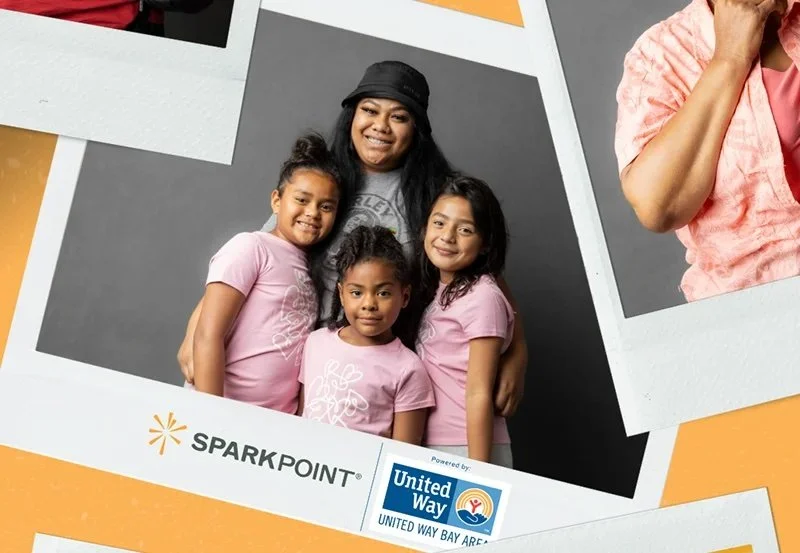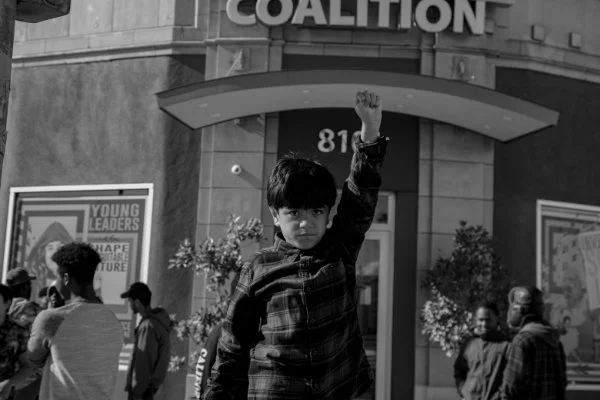SHIELDS for Families has worked to empower and advocate for families in South Los Angeles for more than 30 years. The organization engaged PHS to conduct a community needs assessment to further uplift voices of clients, community members, and collaborators. Our needs assessment successfully supported the design and roll-out of South LA’s first certified community behavioral health clinic.
Healing-centered care is essential to achieving health equity, a core value and impact area for PHS. Health care providers often seek our support in exploring what constitutes culturally-relevant care in the communities they serve and designing responsive programs. With our partners at Adventist Health White Memorial Hospital, PHS applied human-centered design to the development and pilot of an OB/GYN medical education curriculum to support healing-centered care. Credit for mural in photo: East Los Skyscrapers
SparkPoint Centers are community centers designed to support students and families in achieving academic success and housing and economic stability. PHS and partner Cindy J. Wong Consulting were engaged by United Way Bay Area to complete a participatory evaluation of the SparkPoint Toolkit. The final Toolkit is being used by colleges and universities statewide to support equitable pathways to prosperity for their students.
PHS collaborated with Oregon Department of Justice Trafficking Response and Intervention Program (TRIP) on a community intervention to respond to human trafficking. The TRIP team worked with survivors, advocates, and service providers to compile their stories. PHS in turn designed story cards and a facilitator’s guide to make the stories accessible. The materials are being used to train service providers who engage with survivors of sex trafficking.
California Domestic Workers Coalition (CDWC) is a statewide alliance of community-based organizations, domestic employers, worker centers, labor unions, faith groups, students, and policy advocates. CDWC sought to build a strategy for advocacy and outreach by understanding working conditions of domestic workers in geographic context. PHS came alongside CDWC to untangle complex relationships among various datasets to paint a clear picture of working conditions for domestic workers in California.
PHS is proud to have co-authored with The Children’s Partnership and First 5 Center for Children’s Policy a report and policy brief describing the array of community-based programs in California that support the social and emotional health of infants, toddlers, and preschoolers.
Valley Care Community Consortium, Tarzana Treatment Centers, and Center for Living and Learning sought to improve care coordination for their clients by using a social determinants of health (SDoH) platform to support referral and communication. While the initiative was community-led, the providers partnered with PHS, who served as a process facilitator. PHS in turn designed and facilitated a six-phase process for choosing and piloting a SDoH platform.
The magnitude of the housing crisis underscores the need for more efficient and equitable coordination of health services. In response to a Los Angeles City Council motion on this issue, PHS was commissioned by Home For Good of United Way of Greater Los Angeles and Los Angeles City Administrative Office to conduct a rapid-response landscape analysis.
At the start of the pandemic, PHS formed partnerships with numerous community organizations to uplift voices of survivors to prevent violence and homelessness. In October 2020, we published a study with Hub for Urban Initiatives entitled “Responding to Intimate Partner Violence and Homelessness in Los Angeles County during a Time of COVID-19.” It was the product of an intensive four months of rapid-response research with the help of community partners TransLatin@ Coalition, Positive Results Center, and Downtown Women’s Center.
Congress had the opportunity to help families put food on the table and to infuse much-needed spending into the economy by raising the maximum benefit for SNAP during COVID-19. PHS and our partners at Nourish California (formerly California Food Policy Advocates) designed an analysis to help decision-makers understand the impact a 15% boost to SNAP (also known as CalFresh) would have on California by county and congressional district.
Understanding community history is vital to responsible stewardship, whether you are an organization seeking to expand your geographic footprint or navigate neighborhood change. Dr. King developed in collaboration with community leaders in South LA and members of National Coalition for Dialogue and Deliberation a framework known as Critical Dialogues. This is an engagement tool for bringing community leaders and organizations together to create shared understanding of social issues of timely importance to the health of our communities, such as racism and gender justice. Photo credit: Joshua Hamm
PHS led research and evaluation that demonstrated how interventions to support relationship-building and organizational culture are essential to primary care and mental health integration. This implementation research was done in collaboration with colleagues at John’s Hopkins University, Nationwide Children Hospital, and American Academy of Pediatrics. It was part of Dr. King’s doctoral research at Johns Hopkins Bloomberg School of Public Health with her advisor, pediatrician and child psychiatrist Dr. Larry Wissow.
An important aim of the Children’s Behavioral Health Initiative (CBHI) is to improve access to behavioral health screening and community-based services for youth enrolled in MassHealth. Dr. King conducted longitudinal data analyses and designed a series of static and animated maps in ArcGIS to tell the story of how health care access changed over the first three years of the initiative. The maps were used to help identify opportunities to improve health equity.













